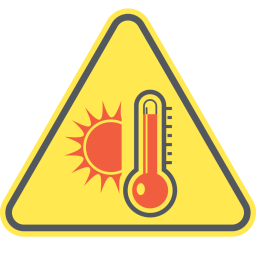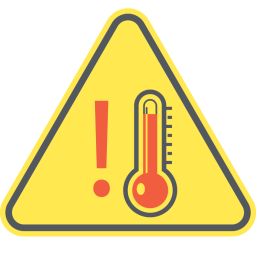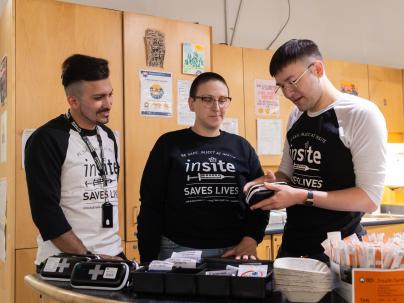Thời tiết quá nóng
On this page
- Các ảnh hưởng của thời tiết quá nóng đối với sức khỏe
- Người có nhiều rủi ro hơn
- Ảnh hưởng của thời tiết quá nóng đối với sức khỏe và cách giảm thiểu rủi ro
- Những bước bảo vệ chính mình và người khác đối với thời tiết nóng bức
- Cách thăm hỏi và yểm trợ người khác trong thời tiết nóng bức
- Các trung tâm có điều hòa không khí và những chỗ mát mẻ
- “Khuyến Cáo về Thời Tiết Nóng Bức” và “Các Trường Hợp Khẩn Cấp Vì Thời Tiết Quá Nóng”
- Những trường hợp cứu xét đặc biệt về sức khỏe tâm thần và sử dụng chất kích thích
- Nghiên cứu và dữ kiện về thời tiết quá nóng
- Các nguồn tài nguyên về thời tiết quá nóng
- Tài nguyên cho các chuyên viên sức khỏe

Thời tiết nóng bức có thể đe dọa đến tính mạng, và mối nguy hiểm lớn nhất là nhiệt độ trong nhà lên cao trong những biến cố thời tiết quá nóng (“đợt sóng nhiệt”). Nhưng có thể phòng ngừa được các ảnh hưởng đối với sức khỏe liên quan đến nhiệt. Hãy tìm hiểu các dấu hiệu của bệnh liên quan đến nhiệt, và những cách chuẩn bị cho thời tiết nóng bức để giữ an toàn cho bản thân, gia đình, bạn bè, và láng giềng.
Liên quan: Thay Đổi Khí Hậu và Sức Khỏe
Các ảnh hưởng của thời tiết quá nóng đối với sức khỏe
Những biến cố thời tiết quá nóng, còn được gọi là “đợt sóng nhiệt,” có thể gây ra một số bệnh liên quan đến nhiệt, và có thể làm tăng số tử vong. Bệnh liên quan đến nhiệt là từ ngữ gọi chung các bệnh trạng do nhiệt độ cao gây ra, chẳng hạn như phát ban do nhiệt, cháy nắng, chuột rút do nhiệt, kiệt sức vì nhiệt, và nghiêm trọng nhất là say nhiệt.
Kiệt sức vì nóng
Các triệu chứng kiệt sức vì nóng gồm có:
- Đổ mồ hôi nhiều
- Phát ban da
- Chóng mặt
- Buồn nôn hoặc ói mửa
- Thở nhanh và tim đập nhanh
- Nhức đầu
- Khó tập trung tư tưởng
- Chuột rút bắp thịt
- Khát nước cực độ
- Nước tiểu sậm màu và đi tiểu ít
Nếu thấy có người bị các triệu chứng này, hãy giúp họ đến một nơi mát mẻ nếu có thể được. Cho họ uống nước, nới lỏng hoặc cởi bớt quần áo, và làm mát cơ thể họ bằng túi chườm đá, khăn ướt, hoặc quần áo ẩm. Tiếp tục làm mát cơ thể họ và cho họ uống nước cho đến khi họ cảm thấy dễ chịu hơn. Nếu các triệu chứng này trở nên nặng hơn hoặc không đỡ hơn, hãy nhờ chăm sóc sức khỏe.
Say nhiệt
Các triệu chứng say nhiệt gồm có:
- Thân nhiệt cao (39°C/ 102°F hoặc cao hơn)
- Ngất xỉu hoặc buồn ngủ
- Lẫn lộn
- Mất khả năng phối hợp tay chân
- Da rất nóng và đỏ (có thể khô)
Say nhiệt là trường hợp cần cấp cứu y tế. Hãy đến ngay phòng cấp cứu hoặc trung tâm chăm sóc khẩn cấp để được trợ giúp y tế. Gọi số 9-1-1 nếu cần. Trong khi chờ được giúp, hãy đưa người đó đến nơi mát mẻ nếu có thể được. Làm mát cơ thể họ nhanh chóng bằng túi chườm đá, khăn ướt, lau người, vòi sen hoặc làm ẩm quần áo của họ. Tiếp tục làm mát cơ thể họ và ở cạnh họ cho đến khi có người đến giúp.
Nếu quý vị không biết chắc hoặc có bất cứ thắc mắc nào không thuộc trường hợp cấp cứu, hãy gọi số 8-1-1 để nói chuyện với y tá.
Người có nhiều rủi ro hơn
Mỗi người đều có phản ứng khác nhau với nhiệt và một số người có nhiều rủi ro bị ảnh hưởng đến sức khỏe hơn. Giữ cho cơ thể mát mẻ thật quan trọng đối với những nhóm người sau đây:
- Người lớn tuổi, từ 60 tuổi trở lên
- Người sống một mình hoặc bị cô lập với xã hội
- Người có bệnh sẵn như tiểu đường, bệnh tim hoặc hoặc bệnh hô hấp
- Người bị bệnh tâm thần như tâm thần phân liệt, trầm cảm, hoặc lo âu
- Người bị rối loạn sử dụng chất kích thích, gồm cả rượu
- Người bị hạn chế khả năng di chuyển
- Người không có chỗ cư ngụ ổn định
- Người làm việc hoặc sống trong các môi trường nóng bức
- Người đang có thai
- Trẻ sơ sinh và trẻ nhỏ
Thời tiết nóng bức ảnh hưởng đến mọi người theo những cách khác nhau, và một số người có thể cần được giúp để giữ cho cơ thể mát mẻ. Khi thời tiết nóng bức, hãy chú ý đến cảm giác của mình và thường xuyên hỏi thăm những người có nhiều rủi ro hơn. Cách tốt nhất để phòng ngừa bệnh liên quan đến nhiệt là ở tại những chỗ mát mẻ và uống nhiều nước.

BÍCH CHƯƠNG
Ảnh hưởng của thời tiết quá nóng đối với sức khỏe và cách giảm thiểu rủi ro
Hãy cho nhau biết về các dấu hiệu của bệnh liên quan đến nhiệt và các hành động để được an toàn hơn trong những đợt sóng nhiệt. Có bản dịch.
Tải xuống bích chương về thời tiết quá nóng (tiếng Anh)Những bước bảo vệ chính mình và người khác đối với thời tiết nóng bức
Khía cạnh nguy hiểm nhất của những đợt sóng nhiệt đối với hầu hết mọi người là nhiệt độ trong nhà lên cao. Ở trong một chỗ mát mẻ và uống nhiều nước là cách tốt nhất để phòng ngừa những bệnh liên quan đến nhiệt.
Khói cháy rừng cũng có thể gây ra các vấn đề sức khỏe. Trong cả những biến cố có khói cháy rừng và nóng bức, hãy xét đến việc lọc không khí bằng cách sử dụng máy lọc không khí có bộ lọc HEPA. Tìm hiểu thêm về khói cháy rừng.
-
Giữ cơ thể mát cho bản thân và người khác
- Ở trong nhà và những chỗ ngoài trời mát mẻ hơn (chẳng hạn như trung tâm cộng đồng, thư viện hoặc trung tâm thương mại có điều hòa không khí).
- Uống nhiều nước và các chất lỏng khác để không bị khô người, ngay cả khi quý vị không cảm thấy khát.
- Tắm vòi sen, tắm bồn hoặc ngâm một phần cơ thể vào nước cho mát.
- Mặc áo ướt hoặc quấn khăn ẩm cho mát người.
- Mặc quần áo rộng rãi, màu sáng, và thoáng hơi.
- Giới hạn hoạt động, nhất là trong những giờ nóng nhất trong ngày (thường trong khoảng từ 2 giờ chiều đến 4 giờ chiều ở B.C.)
- Hãy để ý các dấu hiệu bị kiệt sức vì nóng và say nhiệt. Đối với những người dễ bị tổn thương vì nóng, mức rủi ro bị bệnh liên quan đến nhiệt có thể gia tăng khi nhiệt độ trong nhà lên trên 26°C (78°F) và có thể tăng rất cao khi nhiệt độ trong nhà lên trên 31°C (88°F).
-
Giữ không gian mát mẻ
- Trong ban ngày, hãy đóng cửa sổ và rèm/màn che để giữ không khí mát bên trong và chặn ánh nắng.
- Vào ban đêm, hãy mở cửa sổ và cửa ra vào khi không khí ngoài trời mát hơn (thường là 9-10 giờ tối ở BC). Một số quạt trong phòng tắm và nhà bếp hút hơi ra ngoài và có thể được sử dụng để hút hơi nóng trong nhà ra. Sử dụng quạt cầm tay để thổi khí mát vào nhà suốt đêm.
- Hãy xét đến việc gắn máy điều hòa không khí trong nhà quý vị. Nếu quý vị có máy điều hòa không khí, hãy nhớ mở máy lên.
- Theo dõi nhiệt độ trong nhà cho chính quý vị và những người quý vị đang thăm hỏi. Đối với những người dễ bị tổn thương vì nóng, mức rủi ro bị bệnh liên quan đến nhiệt có thể gia tăng khi nhiệt độ trong nhà lên trên 26°C (78°F).
“Khuyến Cáo về Thời Tiết Nóng Bức” và “Các Trường Hợp Khẩn Cấp Vì Thời Tiết Quá Nóng”
Để ứng phó với vòm khí nóng năm 2021 tại BC, nhiều thành phần hợp tác trong lãnh vực sức khỏe và Bộ Môi Trường và Thay Đổi Khí Hậu Canada (Environment and Climate Change Canada, ECCC) đã phát triển Hệ Thống Khuyến Cáo và Ứng Phó với Thời Tiết Nóng Bức tại BC (BC Heat Alert and Response System) (BC HARS). Hệ thống khuyến cáo hai cấp này nêu rõ các tiêu chuẩn mà ECCC sẽ sử dụng để công bố Khuyến Cáo về Thời Tiết Nóng Bức (Cấp 1) hoặc Tình Trạng Khẩn Cấp Vì Thời Tiết Quá Nóng (Cấp 2), thông tin thích hợp về sức khỏe công cộng cho cả hai loại khuyến cáo, và các hành động được đề nghị cho ngành y tế, chính quyền địa phương, và các thành phần hợp tác khác.
Đọc thêm về BC HARS trên website BCCDC.
Khuyến Cáo
-

Khuyến Cáo về Thời Tiết Nóng Bức (Cấp 1)
Mối đe dọa: Nhiệt độ ban ngày và trong đêm cao hơn mức bình thường của mỗi mùa và giữ nguyên.
Hành động: Áp dụng những bước thông thường để giữ cho cơ thể được mát và thăm hỏi những người có nhiều rủi ro vì nhiệt. -

Tình Trạng Khẩn Cấp Vì Thời Tiết Quá Nóng (Cấp 2)
Mối đe dọa: Nhiệt độ ban ngày và trong đêm cao hơn mức bình thường của mỗi mùa và mỗi ngày càng trở nên nóng hơn.
Hành động: Phát động kế hoạch khẩn cấp và thăm hỏi những người có nhiều rủi ro vì nhiệt ít nhất mỗi ngày một lần.
Các nguồn tài nguyên về thời tiết quá nóng
-
-
Khuyến cáo công cộng về thời tiết cho British Columbia
Khuyến cáo về thời tiết của Cơ Quan Môi Trường và Thay Đổi Khí Hậu Canada (Environment and Climate Change Canada, ECCC) gồm có nhiệt độ và phẩm chất không khí.
-
WeatherCAN App
Chương trình ứng dụng (app) khuyến cáo về thời tiết của Cơ Quan Môi Trường và Thay Đổi Khí Hậu Canada (Environment and Climate Change Canada, ECCC) dành cho điện thoại tinh khôn đưa ra khuyến cáo về nhiệt độ và phẩm chất không khí.
-
Chào Thời Tiết
Dịch vụ thời tiết tự động qua điện thoại của Cơ Quan Môi Trường và Thay Đổi Khí Hậu Canada (Environment and Climate Change Canada, ECCC).
-
-
-
Bích chương về thời tiết quá nóng - tiếng Anh
Vancouver Coastal Health & Fraser Health
-
Bích chương về thời tiết quá nóng – Bản Dịch
Vancouver Coastal Health & Fraser Health; Bằng tiếng: Anh, Ả Rập, Hoa-Giản Thể, Hoa-Phồn Thể, Ấn, Triều Tiên, Ba Tư, Punjabi, Tây Ban Nha, Urdu, Việt và Gujarati
-
Thăm hỏi sức khỏe trong những lúc thời tiết quá nóng – Bản dịch
Trung Tâm Cộng Tác Quốc Gia cho Sức Khỏe Môi Trường (National Collaborating Centre for Environmental Health); Bằng tiếng: Anh, Pháp, Punjabi, Hoa-Giản Thể, Hoa-Phồn Thể
-
Hướng dẫn chuẩn bị ứng phó khi thời tiết quá nóng – Bản dịch
Prepared BC; Bằng tiếng: Anh, Pháp, Punjabi, Hoa-Giản Thể, Hoa-Phồn Thể
-
Các thắc mắc thường gặp (FAQ) về quạt khi thời tiết quá nóng
Vancouver Coastal Health & Fraser Health
-
Tự sắp xếp bộ dụng cụ làm mát của quý vị - Bản dịch
Vancouver Coastal Health & City of Vancouver; Bằng tiếng: Anh, Punjabi, Hoa-Giản Thể, Hoa-Phồn Thể, Tagalog, Việt.
-
Bệnh liên quan đến nhiệt ở trẻ sơ sinh và trẻ nhỏ - Bản dịch
HealthLink BC; Bằng tiếng: Anh, Ả Rập, Hoa-Giản Thể, Hoa-Phồn Thể, Ba Tư, Pháp, Ấn, Nhật, Triều Tiên, Punjabi, Nga, Tây Ban Nha, Tagalog, Ukrainian, Việt
-
Cùng nhau chuẩn bị khi thời tiết quá nóng
Xây dựng Các Khu Xóm Kiên Cường (Resilient Neighbourhoods) và Hợp Tác Xã Láng Giềng (Hey Neighbour Collective) những mối kết nối láng giềng với láng giềng có thể cứu sinh mạng trong những lúc thời tiết nóng bức. Xem những cách hướng dẫn để kết nối, học hỏi, & cộng tác với láng giềng.
-
Giữ gìn máy điều hòa không khí (AC)
Hội Quản Trị Gia Cư Thổ Dân (Aboriginal Housing Management Association); Các đề nghị về hoạt động an toàn và nhiều hiệu năng máy điều hòa không khí lưu động.
-
-
-
Khuôn khổ yểm trợ công việc thăm hỏi khi thời tiết nóng bức cho các tổ chức phi chính phủ
Vancouver Coastal Health và Fraser Health
-
Video Huấn Luyện về Thăm Hỏi Khi Thời Tiết Nóng Bức
Vancouver Coastal Health
-
Thăm Hỏi Khi Thời Tiết Nóng Bức: Video Huấn Luyện Huấn Luyện Viên
Vancouver Coastal Health
-
Bản thảo thí dụ về thăm hỏi khi thời tiết nóng bức
Vancouver Coastal Health
-
Hình rọi huấn luyện về thăm hỏi khi thời tiết nóng bức
Vancouver Coastal Health
-
Huấn luyện về thăm hỏi khi thời tiết nóng bức: Hình rọi huấn luyện huấn luyện viên
Vancouver Coastal Health
-
Các trường hợp thực tập thăm hỏi khi thời tiết nóng bức
Vancouver Coastal Health
-
Các trường hợp thực tập thăm hỏi khi thời tiết nóng bức: Hướng dẫn trợ giúp
Vancouver Coastal Health
-
Gọi điện thoại thăm hỏi khi thời tiết khắc nghiệt cho người cao niên đa ngữ
MOSAIC. Bằng nhiều ngôn ngữ
-
Thành lập những chỗ có điều hòa không khí khi thời tiết nóng bức: Hướng dẫn cho các tổ chức cộng đồng
Vancouver Coastal Health
-
Khuôn khổ yểm trợ khẩn cấp cho người cao niên
Hội Người Cao Niên Renfrew Collingwood (Renfrew Collingwood Senior’s Society)
-
Thông tin về căng thẳng vì nhiệt cho công nhân
WorkSafe BC
-
Kế hoạch mẫu để ứng phó với thời tiết nóng bức và khói cháy rừng cho các chính quyền địa phương
Vancouver Coastal Health
-
Hoạch định ứng phó với thời tiết nóng bức cho các cộng đồng ở Miền Nam Nội Địa BC (Southern Interior B.C): Một bộ công cụ
Interior Health; Tìm hiểu những gì cộng đồng của quý vị có thể làm để chuẩn bị cho thời tiết nóng bức.
-
Hướng dẫn tụ tập ngoài trời
Vancouver Coastal Health
-
-
-
Làm thế nào để trở thành một nhà lãnh đạo thương nghiệp khỏe mạnh khi thời tiết nóng bức
Fraser Health
-
Thông tin về căng thẳng vì nhiệt cho công nhân
WorkSafe BC
-
Hướng dẫn về thời tiết nóng bức cho trường học và cơ sở giữ trẻ
Vancouver Coastal Health & Fraser Health
-
Cơ sở chăm sóc cộng đồng và thời tiết nóng bức
Vancouver Coastal Health
-
Hướng dẫn về tài nguyên: hoạch định cho thời tiết nóng bức
VCH và Cơ Quan Quản Trị Khẩn Cấp về Sức Khỏe BC (Health Emergency Management BC); Các cơ sở chăm sóc cộng đồng có thể bắt đầu hoạch định ứng phó với thời tiết nóng bức như thế nào và những tháng đề nghị cho mỗi bước.
-
Mẫu kế hoạch ứng phó với thời tiết nóng bức
VCH và Cơ Quan Quản Trị Khẩn Cấp về Sức Khỏe BC (Health Emergency Management BC); Mẫu kế hoạch ứng phó với thời tiết nóng bức có thể điền cho các cơ sở chăm sóc cộng đồng.
-
Danh sách kiểm điểm thẩm định địa điểm
VCH và Cơ Quan Quản Trị Khẩn Cấp về Sức Khỏe BC (Health Emergency Management BC); Danh sách kiểm điểm chi tiết về địa điểm và bệnh lý để yểm trợ các cơ sở chăm sóc cộng đồng hoạch định ứng phó với thời tiết nóng bức.
-
Hướng dẫn nhận định mức rủi ro của cư dân
VCH và Cơ Quan Quản Trị Khẩn Cấp về Sức Khỏe BC (Health Emergency Management BC); Tiêu chuẩn nhận định cư dân tại các cơ sở chăm sóc cộng đồng có nhiều rủi ro bị bệnh liên quan đến nhiệt nhất.
-
Danh sách kiểm điểm chuẩn bị ứng phó với thời tiết nóng bức
VCH và Cơ Quan Quản Trị Khẩn Cấp về Sức Khỏe BC (Health Emergency Management BC); Danh sách kiểm điểm ngắn gọn dành cho các cơ sở chăm sóc cộng đồng để điền trước mỗi mùa nóng.
-
Sổ ghi nhiệt độ để ứng phó với thời tiết nóng bức
Vancouver Coastal Health và Cơ Quan Quản Trị Khẩn Cấp về Sức Khỏe BC (Health Emergency Management BC); Mẫu ghi nhiệt độ trong nhà cho các cơ sở chăm sóc cộng đồng.
-
Danh sách kiểm điểm ứng phó với thời tiết nóng bức
Vancouver Coastal Health và Cơ Quan Quản Trị Khẩn Cấp về Sức Khỏe BC (Health Emergency Management BC); Xem xét hằng ngày về mức độ sẵn sàng của các cơ sở chăm sóc cộng đồng trong thời gian có khuyến cáo về thời tiết nóng bức.
-
Bệnh liên quan đến nhiệt: Phòng Ngừa và Quản Trị tại Các Cơ Sở Chăm Sóc Cộng Đồng
Vancouver Coastal Health & Providence Health Care
-
Hướng dẫn về thời tiết quá nóng cho nhà hàng
Vancouver Coastal Health
-
Các Nhà Điều Hành Hồ Bơi về tình trạng thời tiết quá nóng và khói cháy rừng
Fraser Health
-
-
-
Khí hậu nóng bức mùa hè, khói cháy rừng và sức khỏe: Các hành động được đề nghị cho sở hữu chủ và quản lý nhà cho thuê và chung cư
Vancouver Coastal và Fraser Health
-
Các nguồn tài nguyên để chuẩn bị các tòa nhà và cơ sở cho thời tiết quá nóng
Cơ Quan Gia Cư BC (BC Housing)
-
Thẻ thăm hỏi an sinh khi thời tiết nóng bức cho người thuê nhà
Cơ Quan Gia Cư BC (BC Housing)
-
Thành lập những chỗ có điều hòa không khí khi thời tiết nóng bức: Hướng dẫn cho các tổ chức cộng đồng
Vancouver Coastal Health
-
Thẩm Định Tổ Chức về Kế Hoạch Ứng Phó với Thời Tiết Quá Nóng và Khói Cháy Rừng: Danh sách kiểm điểm cho cơ quan điều hành tòa nhà
Cơ Quan Gia Cư BC (BC Housing)
-
Tài nguyên cho các chuyên viên sức khỏe
-
-
Chăm sóc cộng đồng khi thời tiết quá nóng
Bộ Y Tế Canada (Health Canada)
-
Chăm sóc cấp tính khi thời tiết quá nóng
Bộ Y Tế Canada (Health Canada)
-
Kế Hoạch Hành Động Khi Có Khói Cháy Rừng và Thời Tiết Quá Nóng (có chỉ dẫn cho người phục vụ)
Legacy for Airway Health, UBC, VCH Research Institute
-
Các cơ sở y tế chuẩn bị ứng phó khi thời tiết quá nóng
Bộ Y Tế Canada (Health Canada)
-
Hướng dẫn kỹ thuật cho nhân viên chăm sóc sức khỏe
Bộ Y Tế Canada (Health Canada)
-
Cho dược sĩ (gồm cả các yếu tố rủi ro của thuốc)
Bộ Y Tế Canada (Health Canada)
-
Các Thắc Mắc Thường Gặp (FAQ) về Thời Tiết Quá Nóng và Khói Cháy Rừng
Vancouver Coastal Health
-
Tài Nguyên về Tình Trạng Thời Tiết Quá Nóng và Khói Cháy Rừng
Vancouver Coastal Health
-
















